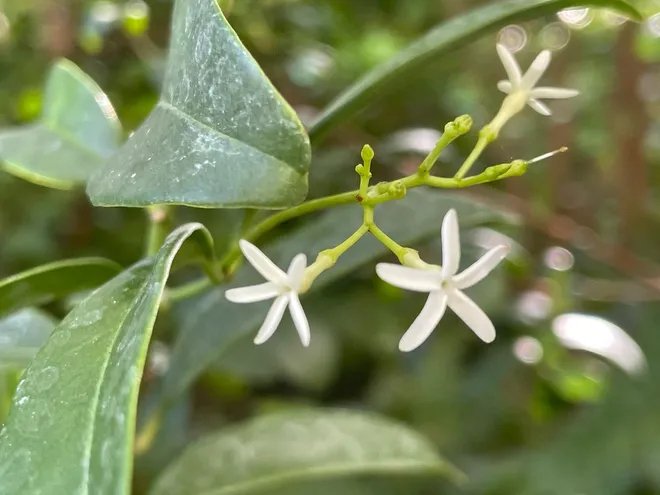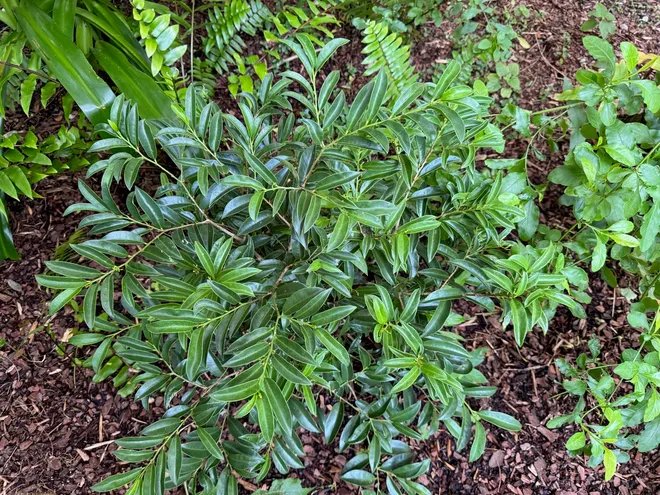Too much light from your house at night can harm native birds, insects.
Too much light from any building at night can disrupt the rhythms of life for birds, insects and even the humans at the top of the food chain.
One way to protect native pollinators and butterflies is to turn down building lights at night. Another is to limit the use of pesticides, and to rely on organic alternatives.
February 2, 2024
Let’s turn off those lights!
I’m sure most of you favor the habit of turning off lights at night, but that’s usually to save electricity and ensure it’s dark enough to sleep. Many keep outdoor lights on for security reasons, although I thought this was why we lived in Palm Beach: It’s pretty safe here! In any event, leaving a porch light on may be OK for some, but to have the entire exterior of one’s home ablaze all night seems a rather unnecessary waste of money and electricity.
But there’s much more to this: Light affects the circadian rhythms of birds and insects and disrupts their sleep, feeding, flight, and breeding patterns. These disruptions can lead to physical impairment, disease, and death for many species of insects and important pollinators.
Artificial and unnecessary light is equally disruptive to birds. Migrating birds are confused and disoriented by artificial light in windows, and hundreds of millions are killed in building collisions every year. Light also disrupts the flying patterns of night-feeding birds and mammals including bats and owls. Nocturnal life represents half of biodiversity, and we would do well to appreciate the importance of true darkness to this vital component of our world.
Nocturnal insects are attracted to artificial lights when they are migrating or seeking mates or food and cannot escape the overwhelming fluorescence to which they become transfixed. They become easy prey to predators or simply die of exhaustion, unable to escape the biological pull of the light. Satellite views of the United States at night show vast portions of the country ablaze. I understand the need for city lights where there is much evening activity, but do we need to leave lights on in office buildings all night long?
Pearlberry is an excellent choice foe semi-shady areas that would benefit from small, evergreen shrubs. It reaches a height of 4 feet and sports white star-shaped blossoms followed by translucent pearl-shaped berries.
Pearlberry reaches a height of 4 feet and sports white star-shaped blossoms followed by translucent pearl-shaped berries.
Since a significant portion of the animal protein consumed on our planet comes from insects, we humans would be wise to protect their welfare. Insects occupy the bottom of the global predator-prey food pyramids; we humans are at the top. The entire pyramid is compromised when the base is undermined, and this is exactly what is happening as we continually deplete our insect populations, which are the basis of our food supply.
If you must leave outside lights on, make sure they are pointed downward, as this will have less effect on sky glow and glare, both of which disrupt wildlife behavior. Light pollution, chemicals, loss of habitat and fewer native plants all contribute to loss of insect populations.
But what about humans? I know so many people who rely on black-out curtains to reduce the ambient light coming into their bedrooms at night so they and their children can sleep. I don’t close my curtains because I like to wake with the sun, but I resent the exterior light coming from neighbors who leave on outside lamps. My father would never allow us to leave porch lights on unless there was a family member “out” for the evening — and beware his wrath the next morning if the last person home neglected to turn out the lights!
This was considered common courtesy and common sense; why would anyone want to waste electricity, which equated to money? If you are bothered by neighbors with excessive night lighting, have a chat to see if they might consider reducing the number of kilowatts they are burning; they might not even be aware of the inconvenience they are causing. Maybe their lights are on a timer that could be rescheduled to reduce the number of hours.
Ill-timed sprinklers waste water
Another issue in Palm Beach that seems to go unsupervised is the watering. The state has an ordinance prohibiting the use of lawn sprinklers between the hours of 11 a.m. and 4 p.m. as sunlight at these times evaporates the water more quickly than it can be absorbed into the ground. Regardless, I often see sprinklers on at midday, which is a crazy waste of water on our already water-deprived island.
Maypop, South Florida’s native passionflower, is the larval host plant for gulf fritillaries, red hairstreaks, and zebra heliconian butterflies, seen here.
Maypop’s bright red blossoms have a fragrance many find pleasing. The climbing vine can quickly cover an arbor, trellis, or neighboring tree or shrub.
I also see sprinklers watering on very windy days when the spray doesn’t come close to hitting the intended plants but rather submerges sidewalks and passing pedestrians. Again, this is a huge waste of water that we can’t afford to squander. But there seems to be little if any regulation or concern on the part either of residents or police.
Too many pesticides being used on island
Finally, let me just touch on pesticides, again. I have never seen a place more inundated with “environmental” pesticide trucks than Palm Beach. No matter where you are on the island, you can find a technician spraying or injecting chemicals onto plants or into the soil on a daily basis.
If you engage a chemical company to “maintain” your landscape, it would be smart to ask exactly what they are applying to your property, why they are doing this, and how often. You might be surprised to learn that the chemicals they are using are not even necessary, and that they are being applied at a rate not consistent with the application guidelines.
You might also discover that these chemicals are highly toxic to you, your children, and your pets; a friend of mine recently lost her 6-year-old Labrador retriever to cancer that her vet felt was almost certainly caused by the chemicals in her (and her neighbors’) lawns.
I’ve written on numerous occasions about how these chemicals kill not just the intended pests but all our insects and pollinators, leaving no natural predators for the pests and no food for birds and wildlife. Fledgling birds in a nest need up to 700 caterpillars a day to survive; if these are unavailable, the nest will fail.
The upcoming “Where Have All the Songbirds Gone” symposium at our Town Hall on Feb. 5 is the third in this important series to discuss and highlight the serious health risks to children, pets, adults, birds, pollinators, and our environment caused by these neonicotinoids, organophosphates, pyrethroids, and glyphosates. These are all neuro-agents, and studies have raised concerns that they may be linked to autism, Alzheimer’s, Parkinson’s and numerous forms of leukemia. Do we really want these in our landscapes where our children and pets should be allowed to play?
Bitterbush excels in shady areas. This shrub grown to 8 feet, with long weeping branches, small greenish-white flowers and clusters of red berries.
Consider adding native plants to your gardens
I haven’t mentioned any native plants in this article, so I’ll finish with a few superstars that you might consider adding to your gardens: Maypop (Passiflora incarnata), our wonderful native passionflower, is a win-win in any garden. The beautiful, extravagant blossoms have a fabulous fragrance, and this is the larval host plant for gulf fritillaries, red hairstreaks, and the wonderful zebra heliconian butterflies. Plant this and you’ll have a veritable fleet of these colorful creatures with their black and yellow/white striped wings. Maypop is a climbing vine that will quickly cover an arbor, trellis, or neighboring tree or shrub, providing colorful flowers all summer. Pruning will keep it in bounds and it will be one of your favorites.
Another wonderful native is bitterbush (Picramnia pentandra), a beautiful evergreen shrub that grows to 8 feet. With long weeping branches, small greenish-white flowers and stunning clusters of brilliant red berries, this is an exceptional shrub for shady situations where it may be difficult for other plants to grow. This is dioecious, meaning male and female parts are on separate plants, so you must have a male tree nearby to have berries on the female. This is a great pollinator attractor and is the host plant for the bush sulphur butterfly.
If you have a neglected, semi-shady spot and are looking for something not too big but evergreen and attractive, try pearlberry (Vallesia antillana). This well-behaved, rounded shrub reaches a height of 4 feet with an equal width and sports beautiful, small, white star-shaped blossoms followed by translucent pearl-shaped berries. Listed as endangered by the state, this is a great plant to add to your landscapes; it is not seen often enough in Palm Beach gardens.
Plant natives, stop spraying toxic pesticides (there are organic alternatives, but make sure they are truly organic, not just pyrethroids which simply mimic organics but still do plenty of damage), turn down (or off!) your lights, and get out and enjoy your gardens — that’s what they’re for! They’re not meant to be sterile green backdrops to your home. Gardens should be alive and beautiful to provide habitat and sustenance to our environments, our wildlife, our birds, our pollinators and ourselves.
-Kim Frisbie
Original article on the Palm Beach Daily News is HERE.






